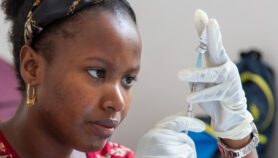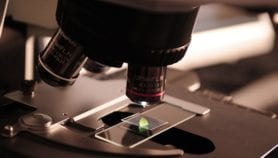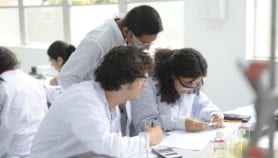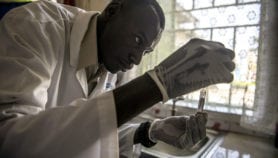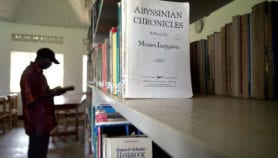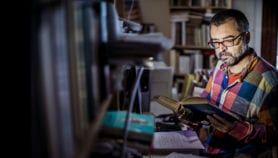Send to a friend
The details you provide on this page will not be used to send unsolicited email, and will not be sold to a 3rd party. See privacy policy.
Developing countries must use science communication to create an empowering culture of science, says Jorge A. Huete-Pérez.
Information and knowledge are essential for development. This belief underpins the concepts of ‘information society’ and ‘knowledge society’, which together represent a strategic aspiration towards modernity.
Recognising the role of journalists and scientists in development, the Nicaraguan Academy of Sciences, together with SciDev.Net and other organisations, recently held a science journalism seminar entitled Science and Outreach at the Central American University, Managua, Nicaragua.
The objectives of events such as these — training journalists and strengthening capacity in science journalism — are considered routine in industrialised countries. Yet achieving them takes Herculean efforts for many developing nations.
In Central America there are relatively few scientists, and they have limited opportunities for a research career. Investment in science and technology is meager — estimated at 0.5–0.7 per cent of GDP. This discourages young researchers and forces them to emigrate. That, in turn, limits a country’s scientific capabilities and curtails the benefits that come from a rich reserve of scientific and technical knowledge.
Faced with these issues and the growing impact of science and technology on people’s lives, Central American countries must establish priorities for science communication and build a culture of science.
Not just news
Poor political commitment to science from decision-makers in the developing world puts countries at a clear disadvantage for sustainable development. This lack of progress undercuts interest in science communication, which has not fared well as a result.
While the more developed countries in Latin America, such as Chile and Mexico, began training science journalists and communicators in the 1960s, Central America took its first steps in this direction only a few months ago — half a century later.
The situation in Latin America is a paradox: although the volume of news about science, technology and innovation are greater than ever, the majority of our citizens lack the skills necessary to interpret the true value of these new concepts and discoveries.
Public education is in a state of profound crisis. In Nicaragua, not even 5 per cent of aspiring university students are able to pass admissions exams.
Under these circumstances, science communication must be about more than just science news — it also needs to educate people about the value of scientific discoveries. Science communication should be facilitating greater social ownership, commitment and participation in the political decision-making process for science and technology.
Lasting ties
Identifying priorities is the first step towards successful science communication. These might include setting up community science fairs and ‘discovery museums’, as well as sound university programmes and annual prizes for science communication.
But we must also build strong and lasting ties between communicators and scientists in conjunction with civil society.
This must be based on a view of science communication as an essential tool for human and social development — communicators should not be regarded as mere intermediaries between scientists and civil society.
And researchers should not regard science communication as exclusively an instrument for publicising their own achievements or securing more grants.
Scientists’ obligation to share their findings with the press should be accompanied by a commitment on their part to value the role of science communicators, who take on the crucial task of critically monitoring research efforts — a natural exercise within democratic societies.
In developing countries, communicating the progress and challenges of science and technology should be managed strategically to create a culture of science, and to aim for higher levels of social ownership.
Such a ‘culture of science’ is often discussed in terms of ‘science literacy’ and the ‘popularisation of science’. But the concept should be understood as the collection of knowledge that allows individuals to understand themselves and their natural environment.
Signs of progress
It is absolutely necessary to incorporate efforts to improve science communication into a comprehensive plan for scientific development — without this, they will not have a lasting impact.
And beyond simple discourse governments must put their words into actions, seeing science communication and scientific advances not as gifts to be bestowed upon society, but a necessity for the implementation of science policies.
Organising outreach activities provides an ideal opportunity for foundations and science academies — the promoters of science development — to incorporate such activities into a national planning and coordination scheme. This would reflect these organisations’ key role in institutionalising science in Latin America and the rest of the developing world.
The Nicaragua science journalism seminar, and its participants’ favourable evaluations, marks a significant achievement in a challenging environment. And it sets a positive precedent for this kind of activity, particularly for poor countries.
There are other significant signs of progress in Nicaragua. The Central American University has committed to implementing a programme for scientific outreach and journalism, specialising in science and technology. And the cooperation agreement between the Nicaraguan Academy of Sciences and the Nicaraguan Council of Science and Technology, CONICYT, has developed a joint programme in this area.
Without a doubt, supporting the communication of advances in science and technology will be a huge contribution to creating the scientific culture necessary to confront the challenges of a knowledge-based society.
Dr. Jorge A. Huete-Pérez is director of the Molecular Biology Center of the Central American University in Managua, Nicaragua. He is also founding president of the Nicaraguan Academy of Sciences.



